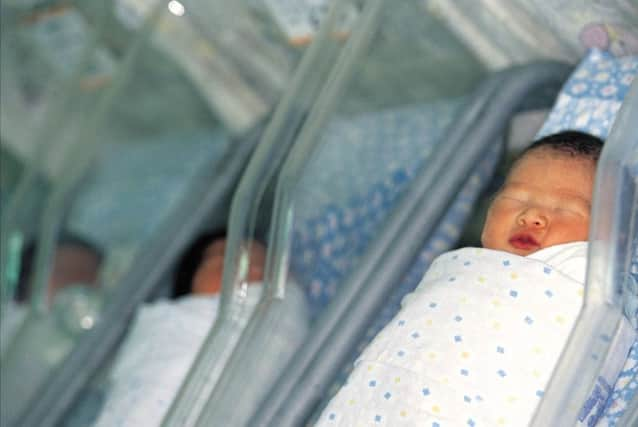Tiffany Jenkins: Fertility is down across the world


SOCIAL commentators have for centuries warned of the impending problems that will be brought about by population growth. Thomas Malthus, writing in the 19th century, is the most well-known.
The rise in population will outstrip food supply, he argued. More people on the planet would inevitably lead to famine, he said. But food production more or less kept up with population growth, which continues to rise. In 1820, shortly after Mr Malthaus was prophesying doom, the world’s population reached one billion. Today, incredibly, it’s 7.3 billion.
Advertisement
Hide AdAdvertisement
Hide AdCenturies after Thomas Malthus was proven wrong, the warnings about the danger of population growth continue apace.
The United Nations Population Division has just released figures that suggest that world’s population will increase to 9.7 billion in 2050 and maybe reach 11.2 billion by the end of the century.
The response from many quarters has been to promote fear and to scaremonger. Simon Ross, chief executive of Population Matters, told the BBC “I really am worried about the future. We’ve got a high birth rate, and we’re living longer,” as if it would be preferable if there were fewer people on earth and if everyone died at an earlier age.
Professor Jane Falkingham, director of the Economic and Social Research Council’s Centre for Population Change, warned: “There will be issues around food, there will be issues around water.”
At least Mr Malthaus didn’t moan about longevity, but then in 1800 the average person only lived to 40 years of age. Life expectancy for men and women in Scotland today continues to rise and is now 76.8 years for males and 80.9 years for females.
Good news, but gloomy headlines warn us about the burden of ageing, rather than the wonders of living healthier and longer lives.
What’s interesting is that the majority of responses to the United Nations world population figures failed to notice one of the most profound changes taking place, and quite possibly one of the most worrying: whilst overall the population continues to rise, statistics show that the population growth rate is dramatically slowing down, everywhere.
The Financial Times reported that 83 countries, including those in Europe, now have fertility below the replacement rate of about 2.1 births per woman. It predicted that in 48 countries the population will decline between now and 2050.
Advertisement
Hide AdAdvertisement
Hide AdUntil recently the overall decrease in the fertility rate was bucked by Africa, but even there the rate of fertility is starting to go down. And then there is the rise in the number of women who do not have children at all.
In the 1940s only one in ten women did not have children; now that figure is almost one in four.
The decline in the fertility rate is not necessarily an urgent social problem. There are plenty of children to go around. And there are very good reasons for the plunge. Population changes of this sort are partly due to positive changes: prosperity, good careers and the freedom of choice.
Historically, the shrinking of family size has been caused by economic progress and women’s liberation. But the increasing unwillingness of people everywhere to have children like they once did should make us pause to reflect. You would think that human beings would be rather fond and attached to the human race. A decline in the fertility rate suggests a waning attachment.
When you look at how children and parents are discussed, a waning attachment isn’t all that surprising. Talk of raising children today is too often dominated by warnings, about the expense, drama and risk posed to all from family life.
The cost of raising a child from birth to 18 has soared to an astonishing high of almost £150,000, a report published this week by the Child Poverty Action Group found. Though if you look at how the organisation reached that figure, you will see included in its sums the kinds of fancy holidays and pricy birthday parties that are well out of reach of many parents.
It’s not just expensive to raise a child, we are told, it’s emotionally demanding. And it’s not that easy to get it right either, if it’s possible to get parenting right at all. Some of the more hysterical children’s charities and the state like to remind everyone just how difficult and unlikely that is – the Scottish Government deems parents so useless that every child in Scotland now has a “named person”, someone who is specifically not a family member, to look out for their well-being.
It’s not that there are no difficulties with having children and with population growth - there are - but that the obsession with the worst-case scenario is overkill. It’s possible that parents, or potential parents, are listening too closely to the warnings, about how hard and awful it all is, believing, perhaps, the scare stories about how likely it is, in the words of the poet Philip Larkin, for them to “f**k up” the kids, even if they don’t mean to.
Advertisement
Hide AdAdvertisement
Hide AdAnd that is a shame. Because despite the money, the tears and the tantrums, ask any parent and they will tell you they wouldn’t change a thing – if they could go back in time, they wouldn’t not get pregnant. Because as well as being hard on the wallet, emotionally draining and knackering, having a kid is also one of the most amazing, life changing things anyone can do: raising them, nurturing the next generation, is important.
One response to the UN population figures was more optimistic that the rest, thankfully. Dr Jenifer Baxter, from the Institution of Mechanical Engineers, pointed out that a growth in numbers of people brings with it economic and social benefits. “With every population increase most countries will also experience an economic increase. We are all better off by having more people.”
So go forth, and make sure that some of you multiply.